Have you ever wished you could peek behind a resume to see what a candidate is truly capable of before making a hiring decision?
That’s precisely what hiring assessment tests are designed to do.
Hiring assessments help businesses identify candidates who are not just qualified but are the right fit for their team. This is especially useful in fractional hiring, where companies need to assess short-term or part-time professionals for specific roles.
They offer a clearer, more objective look at a candidate’s skills, personality, and potential for success within the company, enabling smarter, more effective hiring decisions.
Let’s explore how hiring assessments work and why they are so crucial in the hiring process.
What Is a Hiring Assessment?
Hiring assessment refers to the systematic process used by employers to evaluate potential candidates for a job role.
This evaluation goes beyond reviewing resumes and conducting interviews; it incorporates various tests and exercises designed to assess a candidate’s abilities, personality traits, and job fit.
The primary goal of hiring assessments is to gather objective data that can predict a new hire’s performance and potential for long-term success within the organization.
By employing hiring assessment tools, employers gain a deeper insight into their applicants’ capabilities and character, allowing for informed decisions that are crucial for the company’s immediate needs and strategic goals.
Watch: How to Create an Assessment Online
What Methods & Tools Are Used for Hiring Assessments?
Employers use diverse methods of hiring assessments to ensure they select candidates who are skilled and a good fit for their organization.
Hiring assessment tools range from technical skill evaluations to personality and integrity tests, each serving a specific purpose in the hiring process. Here are the common examples of hiring assessments:
1. Skills Tests
These are crucial for verifying the specific skills required for a job. For instance, a skill assessment quiz can assess a software developer’s knowledge of programming languages and problem-solving skills under timed conditions.
Similarly, a mechanical engineer might be tested on their understanding of engineering principles and their application in real-world scenarios. These tests are highly effective in validating the technical qualifications listed on a candidate’s resume.
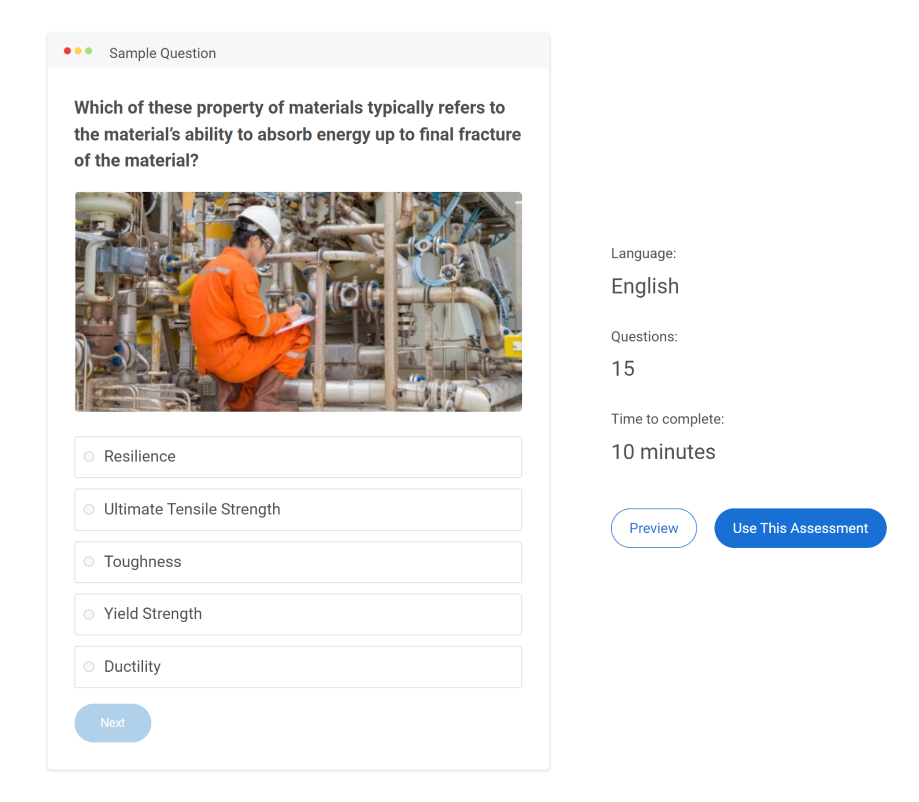
2. Cognitive Ability Tests
These tests measure a candidate’s ability to think critically, solve problems, and process information efficiently. They often include components such as numerical reasoning, verbal reasoning, and abstract reasoning quizzes.
For example, a numerical reasoning test might require candidates to analyze data and make calculations that reflect real job tasks, helping employers predict how well candidates will handle the mental demands of the job.
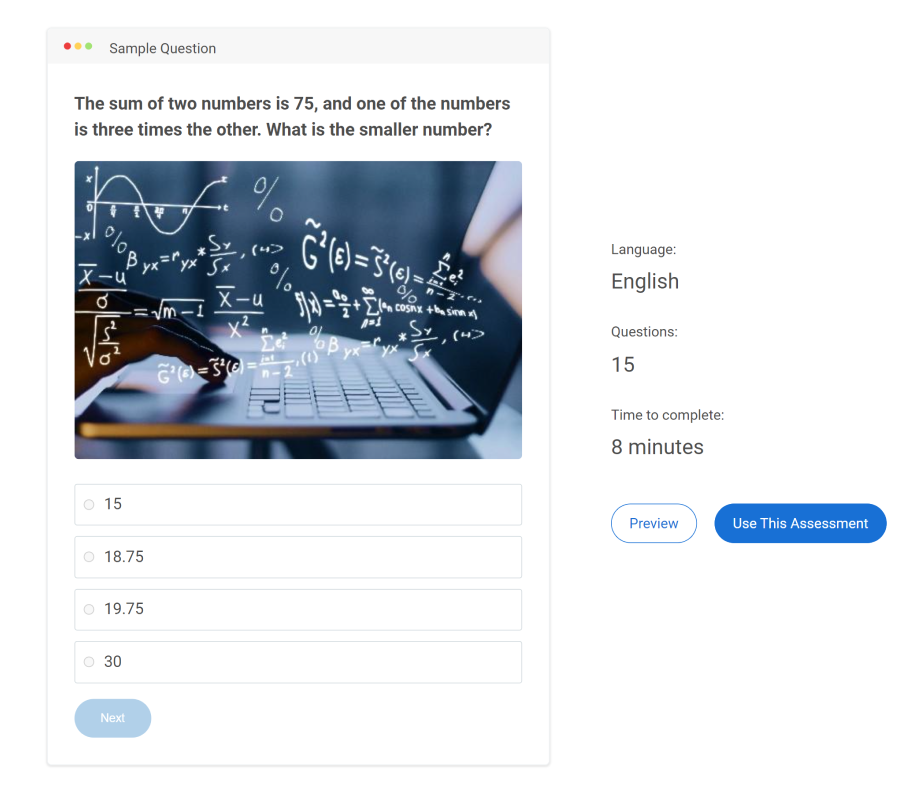
3. Personality Tests
These assessments help determine whether a candidate’s personality traits align with the company’s culture and the demands of the role.
Online personality quizzes are widely used for their efficiency and ability to provide consistent, quantifiable data.
Tests like the Myers-Briggs Type Indicator or the Big Five Personality Traits assessment give insights into how candidates might behave in different scenarios and interact with other team members.
Read: Guide to Pre-Employment Personality Tests: An Essential Tool for New Hiring
4. Situational Judgment Tests (SJTs)
SJTs assess a candidate’s judgment and decision-making in work-related situations. These tests present hypothetical scenarios through online platforms and ask candidates to select how they would respond from multiple choices.
This method is effective in roles requiring quick thinking and ethical decision-making, as it showcases a candidate’s practical application of their knowledge and skills in potential real-life situations.
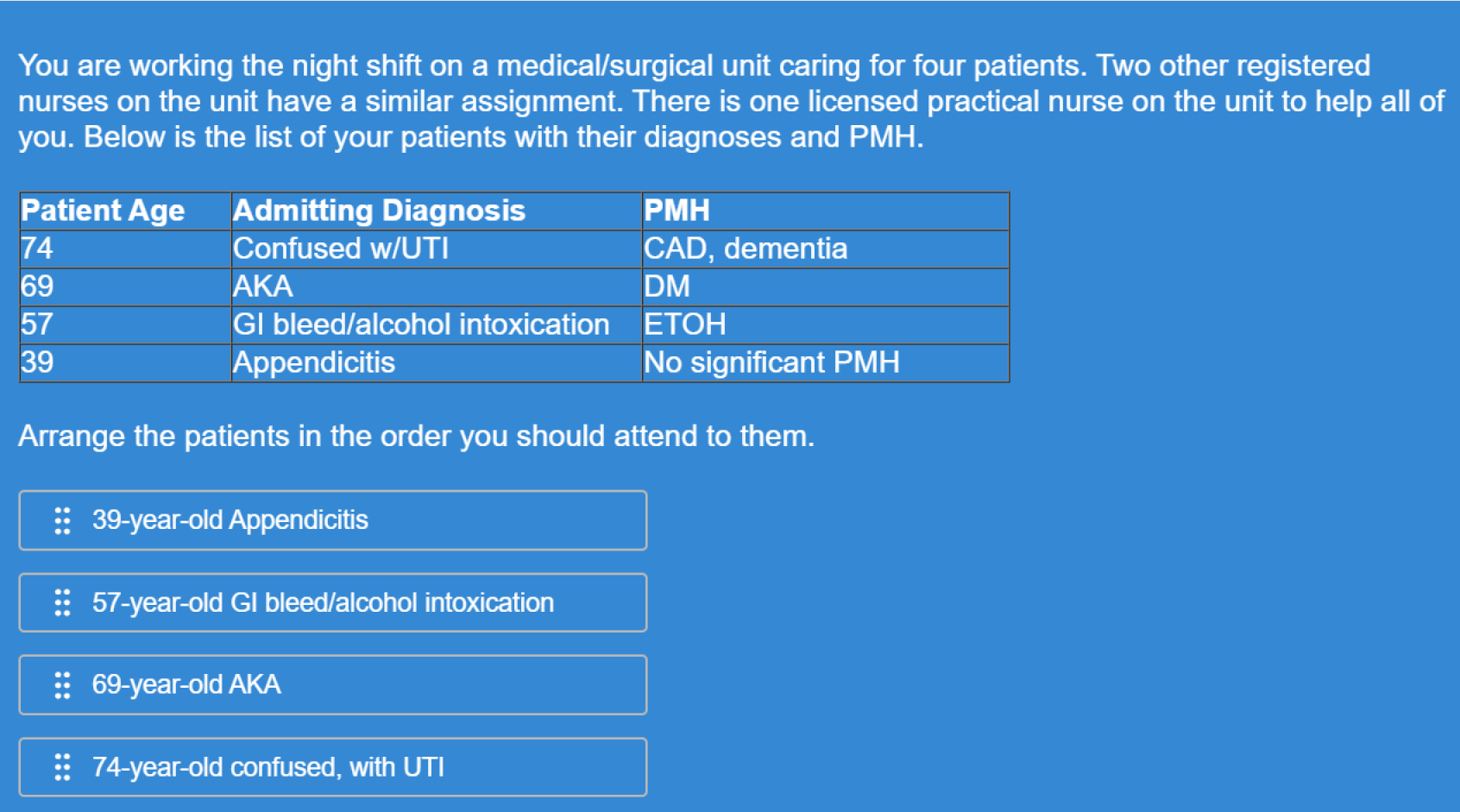
5. Integrity Tests
Integrity tests evaluate a candidate’s honesty and moral principles, which are especially important in positions of trust and responsibility. These tests might include hiring assessment questions about handling confidential information or dealing with workplace dilemmas.
Conducted online, they provide a standardized way to assess ethical behaviors and decision-making, which are critical for maintaining the organization’s standards and reputation.
6. Job Simulations
Job simulations mimic actual job tasks, providing a realistic assessment of how a candidate performs duties they would be responsible for. This might involve a virtual simulation where a candidate demonstrates their ability to use specific software or tools.
For roles that require direct customer interaction, simulations might include handling a series of customer inquiries to assess interpersonal and problem-solving skills.
7. Interviews
Interviews are a critical part of the hiring process, providing insights into a candidate’s skills and compatibility with the company culture. The advent of video technology has enhanced this process, particularly through the use of video interview quizzes.
These quizzes allow candidates to record their responses to predetermined questions, ensuring a uniform assessment process. This method not only evaluates communication skills but also examines how candidates solve problems and adapt to scenarios.
The flexibility of video interview quizzes benefits both candidates and hiring teams. Candidates have the convenience of completing the interview at a time that suits them while hiring managers can review the recordings at their own pace.
Watch: How to Create a Video Interview Quiz
By employing these varied assessment types, companies can form a nuanced understanding of a candidate’s abilities, personality, and potential fit within their organization.
Related Read:7 Best Recruitment Assessment Tools for Better & Faster Hiring
Why Do Employers Use Hiring Assessments?
Hiring assessments are a strategic tool for employers aiming to make the most informed hiring decisions possible.
Here are reasons why these assessments are so widely used:
- Enhanced Objectivity
Hiring assessments provide a standardized method of evaluating candidates, which helps reduce personal bias and subjectivity that can influence interview-based selections. By relying on quantifiable data from tests and quizzes, employers can focus on specific competencies and traits that are directly relevant to job performance.
- Predictive Insights
Hiring assessment tests are designed not just to gauge current skills but also to predict how well a candidate will perform in a role.
For example, cognitive ability tests have been shown to be strong predictors of job performance across various industries.
Similarly, personality tests can forecast how a candidate might mesh with a team or handle stress, which is crucial for maintaining a productive work environment.
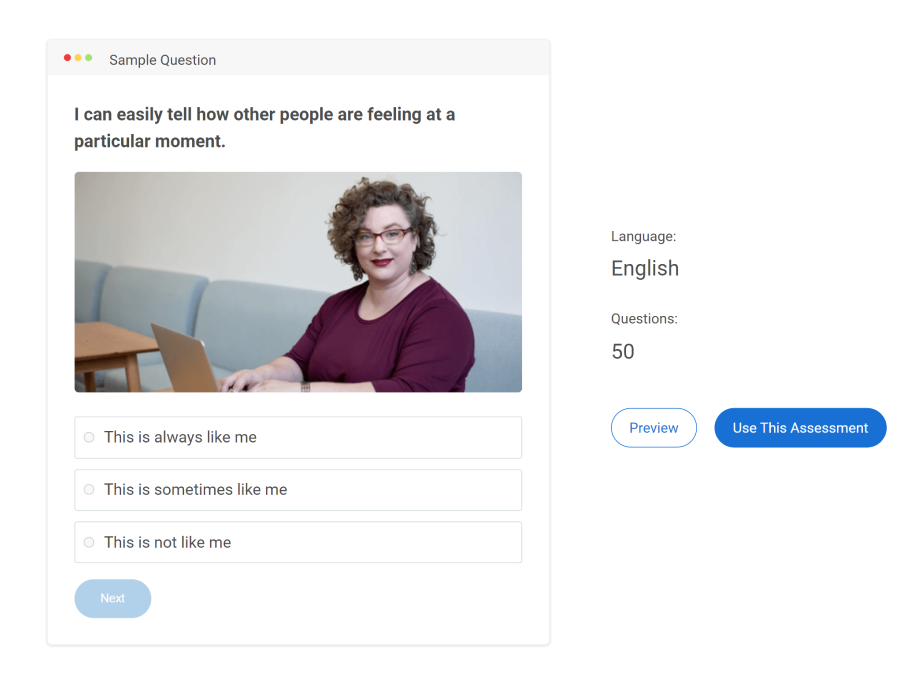
- Streamlined Recruitment Process
Incorporating hiring assessments helps simplify and streamline the entire recruitment process by quickly identifying the most qualified candidates. This efficiency reduces the time and resources spent on interviewing and training unsuitable candidates, leading to faster hires and more effective onboarding.
Read More:How to Simplify Your Recruitment Process (& Hire Faster)
- Better Retention Rates
Employers may see higher retention rates when hiring assessments are used to ensure a good job fit. Employees who fit well with their roles and company culture are more likely to stay long-term, reducing turnover and the associated costs of hiring and training new staff.
- Legal Defensibility
When properly designed, hiring assessments can also provide a defendable basis for hiring decisions in the face of legal challenges. Using objective criteria measured by assessments can help demonstrate that hiring decisions are based on relevant job qualifications, not discriminatory factors.
Overall, hiring assessments are invaluable for employers who want to hire the right people efficiently and fairly, ensuring long-term success for their teams and their organization.
Best Practices for Hiring Assessment
To maximize the effectiveness of hiring assessments and ensure fair and productive outcomes, it’s important to adhere to some best practices. Here are some key strategies to consider:
- Define Clear Objectives: Before implementing any assessment, clearly define what you aim to measure and why. This ensures that the chosen assessments are directly relevant to the specific skills and qualities required for the job.
- Use Validated Tools: Employ assessments that are scientifically validated to predict job performance. This includes ensuring that the tests are reliable, accurate, and fair to all candidates, regardless of their background.
- Ensure Legal Compliance: Stay informed about the legal standards for employment testing in your region to avoid any discrimination claims. This involves ensuring that assessments are not only fair but also compliant with equal employment opportunity laws.
- Combine Multiple Assessment Types: Relying on a single assessment type can lead to biased or incomplete insights.
Combining various assessment methods, such as cognitive tests, skill and psychometric assessments, and personality quizzes, can provide a more comprehensive view of a candidate’s abilities and fit.
- Train Assessors: Ensure that those administering assessments and interpreting results are properly trained. This training should cover not only how to use the assessment tools effectively but also how to understand and apply the results in a hiring context.
- Provide Feedback to Candidates: Offering feedback based on assessment results can improve the candidate experience and enhance your employer brand. This practice demonstrates transparency and respect for the effort candidates put into the application process.
- Regularly Review and Update Assessments: As job roles and organizational needs evolve, regularly review and update assessment tools to ensure they remain relevant and effective. This also helps to keep pace with changes in technology and industry standards.
By implementing these best practices, organizations can enhance the reliability and integrity of their hiring process, making it more equitable and effective in selecting the right candidates.
FREE. All Features. FOREVER!
Try our Forever FREE account with all premium features!
How to Create Hiring Assessment Quizzes
Before we wrap up this post, let’s narrow down our focus to one handy hiring assessment tool: quizzes.
Quizzes provide a simple yet highly effective way to test knowledge, skills, and personality traits. Plus, it’s super-easy to create them using a robust online test maker tool, such as ProProfs Quiz Maker.
Here’s a quick look at the process:
Step 1: Choose the type of quiz you want to create – scored quiz or personality quiz.
Scored quizzes test knowledge and skills and provide a score as the outcome. Personality quizzes analyze the candidate’s personality and behavioral traits and assign them a personality type based on the analysis.
Related Read: How to Create the Perfect Personality Quiz
Watch: How to Create a Personality Quiz
Step 2: Choose a quiz creation method.
You can create a quiz in the following ways with ProProfs Quiz Maker:
- Customize a ready-to-use quiz from ProProfs’ quiz & assessment library.
- Generate a quiz in seconds with ProProfs AI.
- Make a quiz from scratch.
Step 3: Design the quiz cover.
Add the quiz title, cover image, and quiz description. You can also add a video explaining the assessment process instead of the cover image.
Step 4: Add/edit questions and media.
You can add as many questions as you want to your quiz, choose from 15+ question types, and add images, videos, documents, or links for a thorough and engaging assessment.
You can add new questions manually, import them from ProProfs’ question bank or your previous quizzes, or generate questions using ProProfs AI.
Watch: 15+ Question Types for Online Assessment
Step 5: Automate grading for objective question types.
Choose between regular, partial, and custom grading and assign points to questions and answer options.
You can also enable negative marking to penalize wrong answers.

Note: If you’re creating a personality quiz, you need to set up the personality-based outcomes and match each answer option to an outcome.
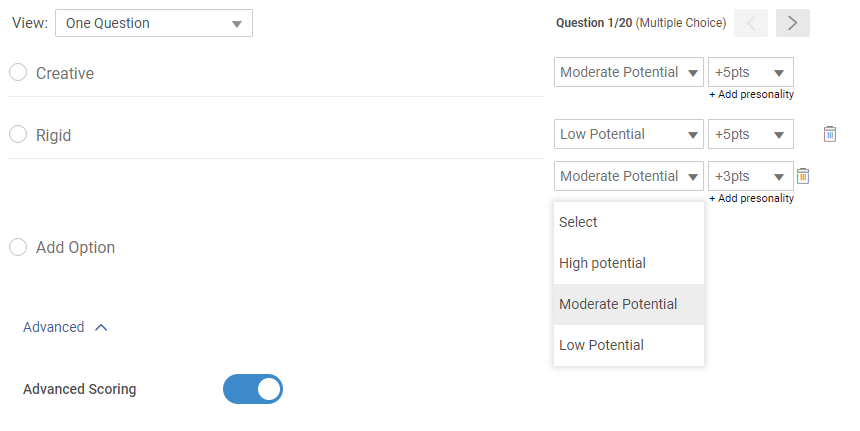
Step 6: Configure settings and the theme.
Change the quiz settings to match your requirements. For example, you can:
- Set up anti-cheating measures, such as proctoring, tab switching prevention, question/answer shuffling, question pooling, and more.
- Set a time limit on the quiz or individual questions.
- Enable notifications for all stakeholders.
- Control what to show assessment takers on the results page.
- Decide the presentation of the quiz.
Watch: How to Customize & Configure Your Quiz Settings
You can also customize the quiz theme by changing the background image, colors, fonts, logo, and more so that the quiz accurately reflects your brand identity.
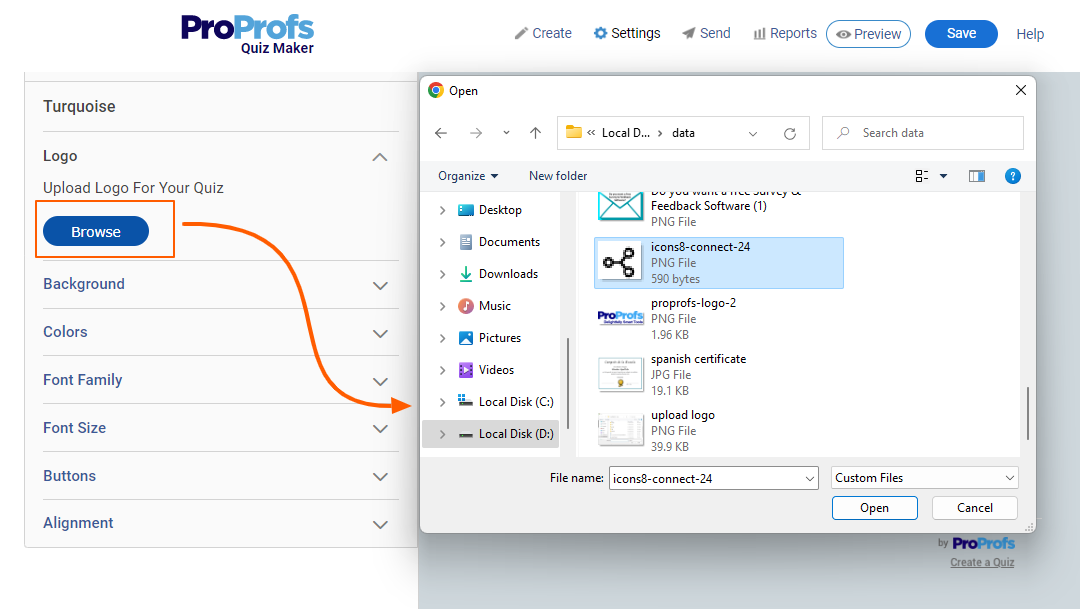
And that’s it. Your hiring assessment quiz is ready in five quick and simple steps.
Case Study: John Baker Sales

John Baker, owner of John Baker Sales, was determined to refine his hiring process and more effectively identify candidates who met his specific requirements.
Initially, John required candidates to visit his office to complete a paper-based test followed by an interview, dedicating an hour to each applicant regardless of their test performance.
To streamline this process and save valuable time, John implemented a remote screening procedure using an online quiz tool for hiring assessments.
He now sends a link to the test to each candidate, allowing them to complete it at their convenience. Those who fail to achieve the minimum score are automatically disqualified, thus enhancing the efficiency of the screening process.
This online hiring assessment system provides instant results through automated scoring and grading, significantly reducing John’s administrative burden and freeing up more time for business-critical tasks.
Maximize Recruitment Success With Hiring Assessments
Effective hiring is crucial for building a robust team that can drive organizational success. Hiring assessments provide a clear view of a candidate’s skills and potential cultural fit, enhancing the accuracy of hiring decisions and streamlining the recruitment process.
By reducing subjectivity, these tools help identify candidates who are likely to excel in their roles and contribute positively to the company’s goals.
Using tools like ProProfs Quiz Maker lets you tailor assessments with precision. The platform’s AI-powered quiz generation, extensive assessment library, and robust security and reporting features let you conduct practical hiring assessments in a hassle-free way.
This approach not only speeds up the hiring process but also improves its effectiveness. It ensures that organizations attract and retain top talent, fostering a dynamic and productive workplace.

 We'd love your feedback!
We'd love your feedback! Thanks for your feedback!
Thanks for your feedback!







